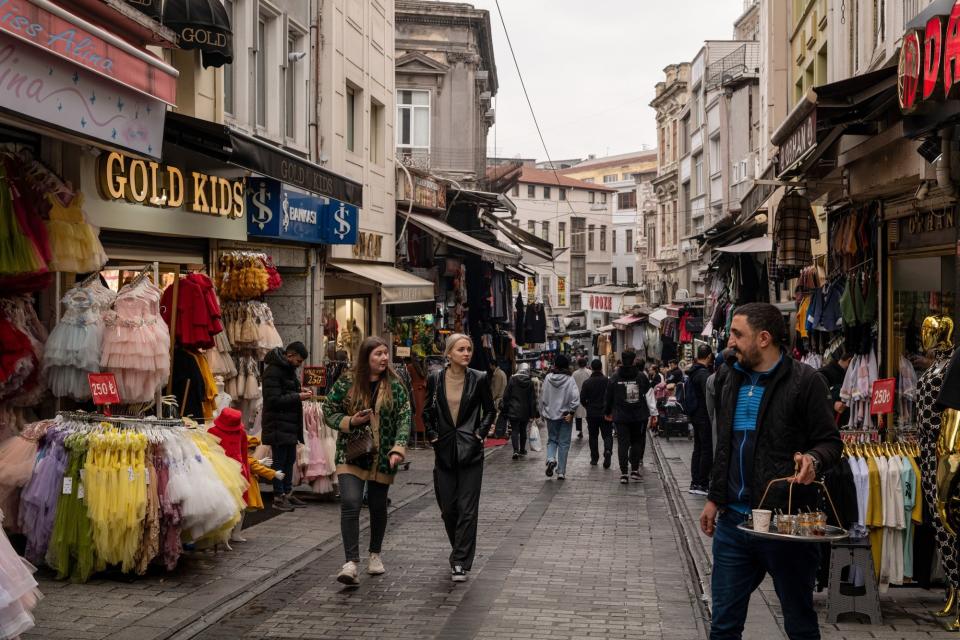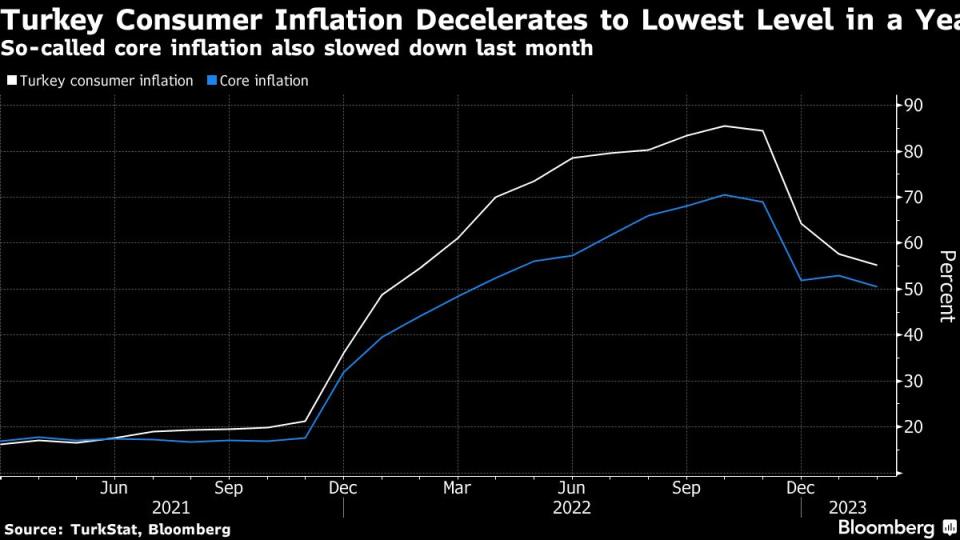Turkish Inflation Falls to Slowest in a Year But Risks Build
- Oops!Something went wrong.Please try again later.
(Bloomberg) --
Most Read from Bloomberg
Amazon Is Closing Its Cashierless Stores in NYC, San Francisco and Seattle
Singapore PM Lee’s Estranged Brother Weighs Presidential Run
Russia Is Getting Around Sanctions to Secure Supply of Key Chips for War
Amazon Pauses Construction on Second Headquarters in Virginia as It Cuts Jobs
Turkish inflation decelerated to its slowest level in a year, though state spending following deadly earthquakes and looser monetary policy could increasingly pose a risk to prices.
Inflation has been slowing in Turkey for the last four months after soaring past 85%, the highest level since 1998. The steep decline is in large part a result of statistical effects because a 2021 currency crisis that prompted prices to spiral created a high base for comparison.
Consumer prices rose an annual 55.2% last month, compared with 57.7% in January, according to data released on Friday. The median forecast in a Bloomberg survey of economists was 55.7%.
But prices are now cooling off at a much slower pace, with the fallout from the disaster further unsettling the outlook while monetary policy remains extremely loose.
The government also plans a stimulus program to offset the economic damage from the Feb. 6 quakes, which may have killed as many as 50,000 people and destroyed thousands of buildings. About 100 billion liras ($5.3 billion) have been allocated for relief efforts alongside cash handouts to families.
What Bloomberg Economics Says...
“Looking ahead, we expect the annual headline rate to fall still through to May. But without the damping effect coming from higher energy prices in the base periods, a consequence of the war in Ukraine, core inflation may prove to be stickier. Together with inflationary pressures coming from the earthquake disasters and the expansionary fiscal response to it, the annual inflation due to base effects may be fading faster than expected.”
— Selva Bahar Baziki, economist. Click here to read more.
In defiance of orthodox economic policy, President Recep Tayyip Erdogan was already prioritizing monetary stimulus before the quakes to shore up voter support ahead of elections in May.
The minimum wage was raised by over 50% at the start of the year, and this week parliament approved a bill granting over 2 million people early retirement, a decision that may come at a cost of $13.2 billion.
“Underlying price pressures in Turkey remain worrying and have likely worsened due to the earthquake,” Goldman Sachs Group Inc. analysts led by Kevin Daly said in a report before the data release. “And although we expect exceptionally high base effects to drive inflation lower going forward, we believe the pace of this decline will be slower than expected before.”
The focus in the wake of the disaster is even more on keeping cheap money flowing into the economy.
The central bank lowered its key interest rate by 50 basis points to 8.5% last month, in part a response to the natural catastrophe. Erdogan promised swift construction in the affected area, which accounts for about 10% of the country’s gross domestic product.
Turkey Hints at Rate Pause After Surprise Cut Follows Quakes
The devastation has also complicated the calculation of economic figures.
The state statistics office said on Friday that “field prices” couldn’t be collected last month in provinces impacted by the earthquakes. Instead, they were compiled with “workplace barcode scanner data” and “price data compiled from the internet via web scraping techniques,” it said.
--With assistance from Harumi Ichikura.
(Updates with chart, economist comment.)
Most Read from Bloomberg Businessweek
Yellowstone Backers Wanted to Cash Out—Then the Streaming Bubble Burst
FBI Documents Show Leonardo DiCaprio, Kim Kardashian Grilled for 1MDB Secrets
How Countries Leading on Early Years of Child Care Get It Right
Female Execs Are Exhausted, Frustrated and Heading for the Exits
Microsoft Expands Game Pass as Regulators Fret Over Activision Deal
©2023 Bloomberg L.P.



